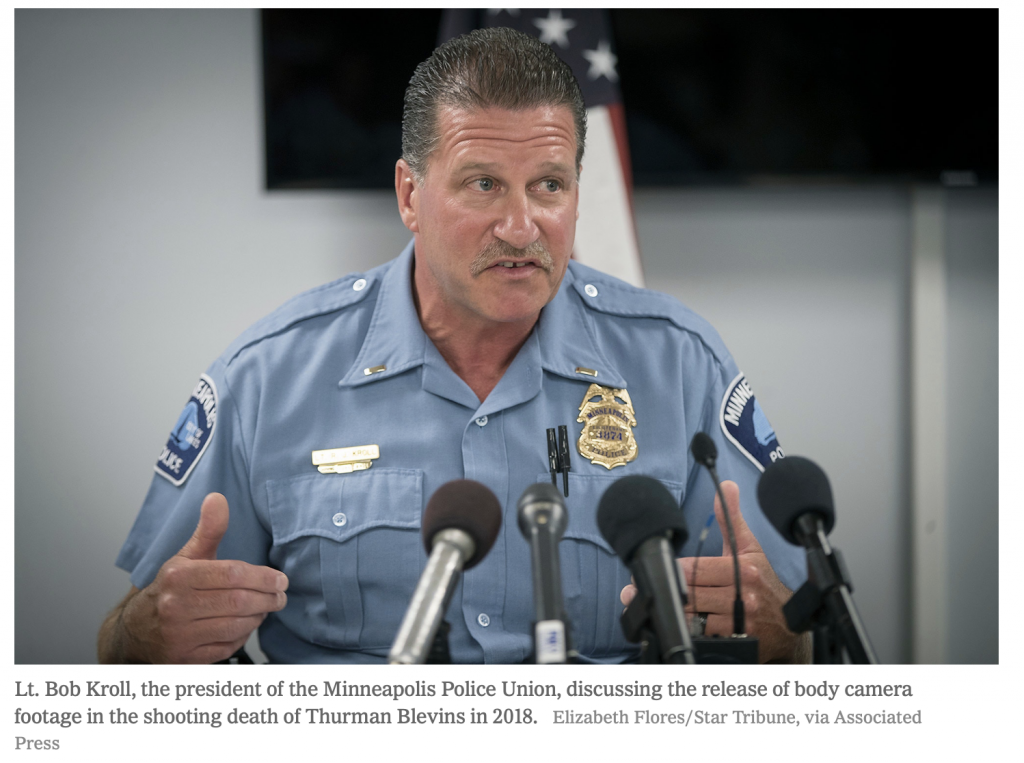
Half a decade after a spate of officer-involved deaths inspired widespread protest, many police unions are digging in to defend members.
By Noam Scheiber, Farah Stockman and June 6, 2020, 12:29 p.m. ET
Over the past five years, as demands for reform have mounted in the aftermath of police violence in cities like Ferguson, Mo., Baltimore and now Minneapolis, police unions have emerged as one of the most significant roadblocks to change. The greater the political pressure for reform, the more defiant the unions often are in resisting it — with few city officials, including liberal leaders, able to overcome their opposition. DIRECT LINK TO NYT STORY
They aggressively protect the rights of members accused of misconduct, often in arbitration hearings that they have battled to keep behind closed doors. And they have also been remarkably effective at fending off broader change, using their political clout and influence to derail efforts to increase accountability.
While rates of union membership have dropped by half nationally since the early 1980s, to 10 percent, higher membership rates among police unions give them resources they can spend on campaigns and litigation to block reform. A single New York City police union has spent more than $1 million on state and local races since 2014.
In St. Louis, when Kim Gardner was elected the top prosecutor four years ago, she set out to rein in the city’s high rate of police violence. But after she proposed a unit within the prosecutor’s office that would independently investigate misconduct, she ran into the powerful local police union.
The union pressured lawmakers to set aside the proposal, which many supported but then never brought to a vote. Around the same time, a lawyer for the union waged a legal fight to limit the ability of the prosecutor’s office to investigate police misconduct. The following year, a leader of the union said Ms. Gardner should be removed “by force or by choice.”
Politicians tempted to cross police unions have long feared being labeled soft on crime by the unions, or more serious consequences.
When Steve Fletcher, a Minneapolis city councilman and frequent Police Department critic, sought to divert money away from hiring officers and toward a newly created office of violence prevention, he said, the police stopped responding as quickly to 911 calls placed by his constituents. “It operates a little bit like a protection racket,” Mr. Fletcher said of the union.
A spokesman for the Minneapolis Police Department said he was unable to comment.
A few days after prosecutors in Minneapolis charged an officer with murder in the death of George Floyd, the president of the city’s police union denounced political leaders, accusing them of selling out his members and firing four officers without due process.
“It is despicable behavior,” the union president, Lt. Bob Kroll, wrote in a letter to union members obtained by a local reporter. He also referred to protesters as a “terrorist movement.”
When liberal politicians do try to advance reform proposals, union officials have resorted to highly provocative rhetoric and hard-boiled campaign tactics to lash out at them. This past week, the head of the sergeants’ union in New York posted a police report on Twitter revealing personal information about the daughter of Mr. de Blasio, who had been arrested during a protest.
Mr. Kroll did not return a call seeking comment. John Elder, the Police Department spokesman, said the current police chief and Mr. Kroll have a strong relationship.
Ms. Harteau said that the department introduced new rules requiring officers to protect the “sanctity of life” and intervene if they saw a colleague improperly using force, but that the union under Mr. Kroll undermined the changes by protecting officers who violated the policies. Data on police shootings and killings in the city appear to show little change despite the reforms.
“I struggle to know if they have gotten more extreme, or if the world has changed and they haven’t,” Mr. Fletcher, the city councilman, said of the union. “Either way, they are profoundly misaligned with the moment.”
Noam Scheiber is a Chicago-based reporter who covers workers and the workplace. He spent nearly 15 years at The New Republic magazine, where he covered economic policy and three presidential campaigns. He is also the author of “The Escape Artists.” @noamscheiber
J. David Goodman covers lobbying, fund-raising and the influence of money in politics. A former reporter in City Hall and at police headquarters in New York, he has written about government, politics and criminal justice for The Times since 2012. @jdavidgoodman


You must be logged in to post a comment Login